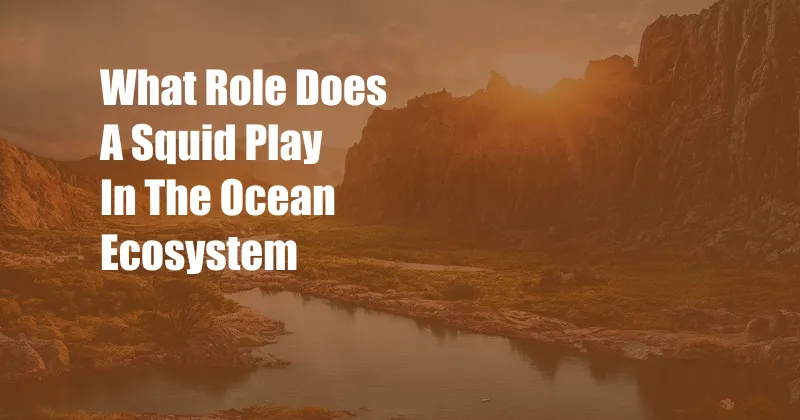
The Vital Role of Squid in the Ocean Ecosystem
In the vast expanse of the ocean, where sunlight dances upon the surface and darkness consumes the depths, a fascinating creature plays an indispensable role in maintaining the delicate balance of marine life. The squid, with its enigmatic appearance and remarkable adaptations, is a keystone species that shapes the ocean ecosystem in profound ways.
From the smallest pygmy squid to the colossal giant squid, these cephalopods are a diverse group that inhabits every corner of the ocean. Their unique body structure, characterized by a mantle, fins, and eight arms, allows them to navigate the watery depths with elegance and speed. But it is their role as both predators and prey that truly underscores their significance in the ocean ecosystem.
Squids: Master Predators of the Deep
Armed with sharp beaks and powerful tentacles, squids are formidable predators that hunt a wide range of marine organisms. They ambush prey with lightning-fast reflexes, using their retractable arms to ensnare their victims. Their diet includes fish, crustaceans, and even other cephalopods, making them apex predators in many oceanic food chains.
Their predation has a cascading effect on the entire ecosystem. By controlling the populations of smaller animals, squids indirectly promote the growth of phytoplankton, the microscopic plants that form the foundation of the marine food web. This delicate balance ensures the availability of food for countless other organisms, from tiny zooplankton to large marine mammals.
Squids: A Vital Food Source for Diverse Predators
On the other side of the predator-prey equation, squids are a crucial food source for a diverse array of marine animals. From seabirds and dolphins to sharks and whales, squids provide sustenance to countless species. Their high nutritional value, rich in protein and lipids, makes them an essential energy source for these predators.
The availability of squid as a food source can significantly impact the population dynamics of their predators. For example, in the North Pacific, the decline in squid populations has been linked to a decrease in the number of seabirds that rely on them for food. This illustrates the interconnectedness of the ocean ecosystem and the importance of maintaining healthy squid populations.
Squids: Environmental Indicators and Sentinels
Beyond their ecological significance, squids also play a role as environmental indicators and sentinels. Their sensitivity to changes in their surroundings makes them potential indicators of ocean health. Scientists monitor squid populations to assess the impacts of climate change, pollution, and overfishing on marine ecosystems.
By understanding the ecology and distribution of squids, researchers can gain valuable insights into the health of the ocean and the broader implications of human activities on marine life. Protecting squid populations is essential for maintaining the balance and resilience of our planet’s oceans.
Tips and Expert Advice for Squid Conservation
Given the vital role squids play in the ocean ecosystem, it is essential to implement conservation measures to protect these fascinating creatures. Here are some tips and expert advice to support squid conservation efforts:
- Reduce overfishing: Unsustainable fishing practices can deplete squid populations, disrupting the delicate balance of the ocean ecosystem. By supporting sustainable fishing methods and choosing seafood from responsibly managed fisheries, we can help protect squids and other marine life.
- Minimize pollution: Pollution from industrial and agricultural sources can harm squids and their habitats. Reducing our carbon footprint, promoting clean energy, and advocating for responsible waste disposal practices can help mitigate the impacts of pollution on marine ecosystems.
- Protect coastal habitats: Coastal habitats, such as coral reefs and seagrass beds, are essential for squid spawning and nursery grounds. Protecting these areas from development and degradation ensures the survival and reproduction of squid populations.
- Support research and education: Understanding the ecology and behavior of squids is crucial for effective conservation efforts. Supporting scientific research and promoting public education about the importance of squids can foster greater appreciation and protection for these remarkable creatures.
FAQs on Squids
- Q: What is the lifespan of a squid?
A: The lifespan of squids varies widely depending on the species. Some species, such as the pygmy squid, live for only a few months, while others, like the giant squid, can live for several years. - Q: Why do squids change color?
A: Squids use their chromatophores, specialized cells in their skin, to change color for camouflage, communication, and defense. They can mimic their surroundings, blend in with prey, or signal to other squids. - Q: Are squids intelligent creatures?
A: Squids have relatively complex nervous systems and demonstrate cognitive abilities, including learning, problem-solving, and memory. They have shown an ability to adapt to changing environments and interact socially with other squids.
Conclusion
The squid, with its captivating appearance and ecological significance, stands as a testament to the intricate interconnectedness of the ocean ecosystem. As master predators, vital food sources, environmental indicators, and sentinels of the sea, squids play an indispensable role in maintaining the health and balance of our planet’s oceans.
Understanding and protecting squid populations is essential for safeguarding the future of the ocean ecosystem. By implementing conservation measures, supporting research and education, and promoting sustainable practices, we can ensure that these remarkable creatures continue to thrive in the depths of the ocean for generations to come.
Are you fascinated by the enigmatic world of squids and their vital role in the ocean ecosystem? Share your thoughts and questions in the comments section below.